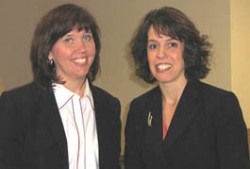 Karin Derry and Kim Bartosh advance to the national finals next month. |
The Drake Law School team of Kim Bartosh of Ankeny, Iowa, and Karin Derry of Johnston, Iowa, recently won the regional American Bar Association Client Counseling Competition at William Mitchell Law School in St. Paul, Minn. They will advance to the national finals at Stetson University College of Law in Gulfport, Fla., on March 17-18.
Bartosh and Derry, both second-year law students, defeated teams from the University of Iowa Law School and William Mitchell in the final round of the competition, which drew 12 teams from seven Midwest law schools.
A second Drake team of Erika Eckley of Des Moines and Kristin Hanks of West Des Moines, both third-year law students, also made a strong showing in the preliminary rounds of the regional competition, but did not advance to the finals. Matt Doré, the Richard M. and Anita Calkins distinguished professor of law, coached both teams.
“I’m very proud of the fine work of both Drake teams,” Doré said. “I watched all three teams in the final round and the Bartosh-Derry team turned in a simply phenomenal performance. Although the other teams were very strong, after watching that round I was sure the Drake team had won.”
Counseling is a vital skill for law students to master, said Drake Law School Dean David Walker. “Lawyers are counselors,” he added, “and the students’ achievement in this competition is really something to be proud of and celebrate, for them and for the Law School.”
Since the 1970s the ABA has been sponsoring the Client Counseling Competition, which focuses on the lawyer’s work of interviewing and counseling clients in the office environment. Approximately 150 teams from law schools across the country participate in regional competitions each year, with 15 schools advancing to the national finals.
At both the regional and national final rounds of this competition, students conduct an initial client interview session with a potential new client. The interview session requires the team to demonstrate their interviewing and counseling skills (by eliciting the client’s problem), as well as their problem-solving abilities (by recommending a tentative course of action for the client).

